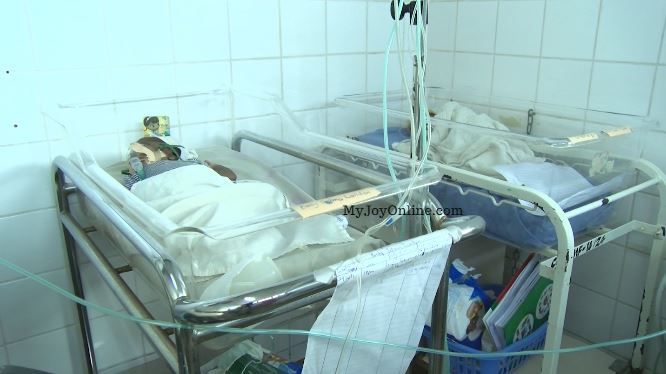A pediatrician teared up on JoyFM's Super Morning Show narrating how bad it feels to watch mothers lose their children after childbirth.
Charlene Sakibu Kilba was contributing to discussion on the Show in respect of challenges being faced by the Neonatal Intensive Care Unit (NICU) of the Cape Coast Teaching Hospital. The discussion was triggered by the outcome of a study by Joy News’ Seth Kwame Boateng, which revealed that one in every three children born at the (NICU) die.
According to her, such scenes are very devastating. "Unfortunately, people think that because we see babies die every day, we're used to it but there's no getting used to seeing a mother roll on the floor because her baby died," an emotional Charlene Sakibu Kilba shared.
Women who conceive for nine months and sometimes more, are hopeful of going to the labour ward and returning with a child. But, not all mothers return with their children alive.
Most devastating is when a mother hears the cry of her child and sees life in it yet, due to lack of a physical need, has to lose the child. This has been the fate of some mothers whose babies end up at the NICU of the Cape Coast Teaching Hospital (CCTH).
Contrary to beliefs that only mothers who suffer this fate go through pain, Dr Kilba says doctors and healthworkers who care for such persons are equally traumatised.
"It is emotionally draining as well as physically draining to have to deal with these issues day in and day out," she said.
Seth Kwame Boateng's report revealed that the situation at the Cape Coast Teaching Hospital is a result of limited space and lack of critical equipment.
In view of this, Dr Kilba called on various stakeholders to tackle the problem holistically. She called for provisions in terms of tools, facilities, and equipment to be provided to hospitals.
"The problem needs to be tackled from not just Teaching Hospitals and our regional hospitals but right down to our district hospitals and maybe the sub-district levels. If we strengthen our district hospitals, the referrals to the regional hospitals will be less," she said.
She added that government must consider building more infrastructure, in terms of hospitals to create enough space to accommodate the patients as part of measures to deal with the situation.
Latest Stories
-
GPL 2024/25: Young Apostles hand Samartex first home defeat since March
32 mins -
Unconventional Trump brings openings and perils for Africa
1 hour -
Iseguri Initiative fights teenage pregnancy and early child marriage
1 hour -
‘Dreams quashed’: Foreign students and universities fear Australia’s visa cap
2 hours -
G20 talks in Rio reach breakthrough on climate finance, sources say
2 hours -
2024/25 Ghana League: Bechem United shock Chelsea in Berekum
4 hours -
GPL 2024/25: Nations FC beat Asante Kotoko to go top
4 hours -
GPL 2024/2025: Gold Stars drop to 2nd after 2-0 defeat to Medeama
4 hours -
#GPL 2024/25: Hearts pip Karela in Tamale to move into top 4
4 hours -
Feedback from Klopp, others more valuable than just anybody – Otto Addo to critics
4 hours -
Support us if you want to qualify for the World Cup – Otto Addo to Ghanaians
5 hours -
Defective ballot papers for Ahafo and Volta Regions destroyed by EC
5 hours -
Election 2024: Be fair and transparent – Togbe Afede to EC
5 hours -
AFCON 2025Q: Poor home form cost us – Otto Addo
5 hours -
Togbe Afede criticises recent Supreme Court rulings as uninspiring and illogical
5 hours

